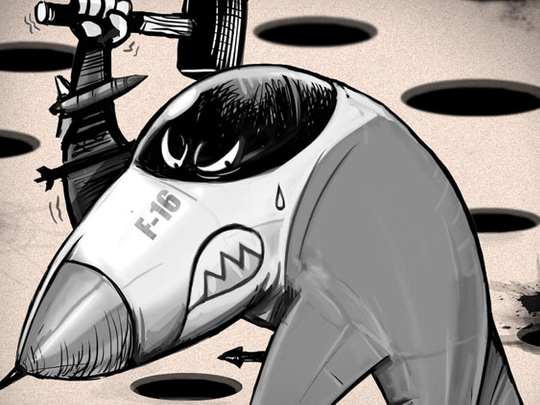
The US-led coalition against Daesh in Syria and Iraq looks impressive in terms of air power and in recent days has been bolstered by the addition of Belgium, the Netherlands, Denmark and the UK, which will confine their participation to Iraq. Saudi Arabia has been leading the charge in Syria together with the UAE. Airstrikes and missiles deployed from US warships are also taking their toll on the capabilities of Daesh fighters and their infrastructure. But as numerous military analysts have pointed out, they cannot be erased without the insertion of boots on the ground, which the US President Barack Obama and America’s allies reject due to domestic public opinion and the spectre of being bogged down in yet another prolonged and costly war.
Critics believe the joint effort is half-hearted and will ultimately prove to be ineffective. For one thing, Daesh has changed tactics. Its fighters no longer travel around in visible convoys and have quit their training camps preferring to melt among civilian populations, hole up in civilian apartment blocks and meet together at night in cafes. Now that they’ve scattered, pinpointing targets is no longer an exact science and there are bound to be civilian casualties. If and when the unintended toll on innocent life reaches unacceptable proportions, there is likely to be a vocal public backlash in western capitals and especially throughout the Arab and Muslim world.
Coalition countries say they’re counting on the Iraqi army and the Kurdish Peshmerga forces to do the job in Iraq and Syria’s legitimate opposition fighters to turn their guns against Daesh in Syria. But let’s be frank. Although the Peshmerga are putting up a brave fight in northern Iraq to protect Christian and Yezidi minorities and to defend Kurdish territories, they admit that Daesh has the advantage in terms of highly sophisticated weaponry. Furthermore, the Kurds’ prime interest is to safeguard their own rather than the defence of Iraq as a whole.
And as for the so-called Iraqi army, its record so far as been less than impressive. It virtually handed Mosul gift-wrapped to around 10,000 terrorists, was incapable of beating back the extremists’ surge towards Baghdad and last Sunday we learned that Daesh managed to overwhelm Camp Saqlawiyah, an Iraqi military base, located just 45 kilometres from the capital that was under siege for over a week. CNN reported that Iraqi soldiers, surrounded by the enemy, phoned their commanders in Baghdad for air cover but no one bothered to answer the phone.
Suicide bombers later drove a truckload of explosives into the camp, leaving up to 500 soldiers either dead or missing. Iraq’s new Prime Minister Haider Al Abadi is said to be appalled and has reportedly sent anti-terrorism forces to hold the military leaders accountable for negligence. A soldier who escaped circulated a video statement describing how the trapped soldiers were abandoned by their superiors to starvation and were forced to drink salty water for days before the final onslaught.
Iraq’s armed forces, once the pride of Saddam Hussain, are today a shadow of their former self, even though Washington has expended billions of dollars in weapons and training over the last decade. So imagining that it can be trusted to combat Daesh is naïve at best and foolish at worst. The best hope, perhaps the only one at this juncture, is to convince Sunni tribes in Anbar province and other areas to drive the terrorists out just as they did in 2007 when Al Qaida moved in, but it is no easy task.
Unchanged
However, although the hated prime minister Nouri Al Maliki has been replaced by a new face, the make-up of the Shiite-dominated government is unchanged. Without the cooperation of Sunni tribes and former Baathists, Daesh will continue consolidating its territorial gains. Air strikes will push them out of towns and villages but won’t prevent them from returning once the dust has settled. The New York Times has quoted Mohammad Al Bajjari, a spokesman for a coalition of tribes in Anbar, saying, “The Sunnis in Anbar and other provinces are facing oppression and discrimination by the government. This government must be changed to form a technocratic government of nonsectarian secular people, or the battles and the anger of the Sunni people will continue.”
In Syria, the situation is even more complex. The good guys who’ve been battling government troops are greatly outnumbered by extremist groups. Obama’s recent pledge to equip and train 5,000 Syrian opposition rebels is yet more pie in the sky when latest estimates suggest that Daesh has 35,000 fighters in addition to unknown numbers of sympathisers.
Obama is a president who likes to dip his toes in the water, but with a ruthless enemy such as Daesh that takes young children to watch public decapitations, that water is fast turning into blood likely destined to flow in western capitals. As unpalatable as the idea of deploying ground troops may be, even with the risk of unintended consequences, there is no other workable solution. There are no perfect cures but one thing’s for sure. In this case, half a loaf is not better than none.
Linda S. Heard is a specialist writer on Middle East affairs. She can be contacted at lheard@gulfnews.com










